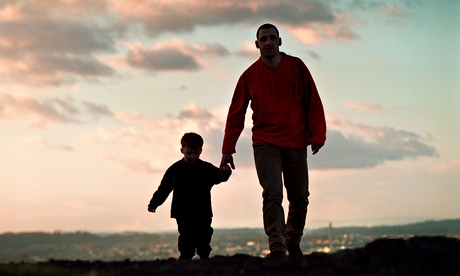
Children born to fathers over the age of 45 are at greater risk of developing psychiatric problems and more likely to struggle at school, according to the findings of a large-scale study.
The research found that children with older fathers were more often diagnosed with disorders such as autism, psychosis, attention deficit hyperactivity disorder (ADHD), schizophrenia and bipolar disorder. They also reported more drug abuse and suicide attempts, researchers said.
The children's difficulties seemed to affect school performance, leading to worse grades at the age of 15 and fewer years in education overall.
"We were shocked when we saw the comparisons," said Brian D'Onofrio, the first author of the study at Indiana University in the US. But he added that it was impossible to be sure that older age was to blame for the problems.
Scientists have reported links between fathers' age and children's cognitive performance and health before but this study suggests the risks may be more serious than previously thought. The increased risks might be caused by genetic mutations that build up in sperm as men age.
Researchers at Indiana University and the Karolinska Institute in Stockholm studied medical and educational records of more than 2.6 million babies born to 1.4 million men. The group amounted to nearly 90% of births in Sweden from 1973 and 2001. Using the records, the scientists added up diagnoses for psychiatric disorders and educational achievements and compared the figures for children born to fathers of different ages.
The numbers told a complex story. When health and school performance were compared across all the children, and factors such as parents' education and any history of psychiatric illness were taken into account, paternal age made little difference, except for cases of bipolar disorder, which rose with older fathers.
But the researchers went on to do another analysis. This compared the health and performance of siblings in the same families, in the hope of ruling out differences between families that may have skewed the results. This time they found a striking link between paternal age and children's mental health and educational outcomes.
According to the study, the children of fathers aged 45 and over were 3.5 times as likely to have autism, had more than twice the risk of psychotic disorders, suicidal behaviour and drug abuse, and had a 13-fold greater risk of ADHD. Fewer than 1% of children born to fathers younger than 45 had bipolar disorder, a figure that rose to about 14% in their siblings when fathers were 45 or older. In many cases, the risk of each disorder rose steadily with the father's age.
The impact on academic achievements was less dramatic. Children with older fathers had a 60% greater risk of poor performance at age 15, defined as the equivalent of an overall fail grade across 16 academic subjects. They were also 70% more likely to spend less than 10 years in formal education.
The findings appear in the journal JAMA Psychiatry.
Some experts have questioned the analysis, because important factors that could be to blame were not ruled out.
While looking at siblings has the advantage of ruling out differences from one family to the next – such as the number of books on shelves and diet – teasing out cause and effect is impossible.
For example, a first born child may do better than his or her siblings at school, but that could be down to the parents having more time to spend with him or her than later children. The father being younger at his or her birth may be immaterial. Equally, a man's second wife may be a worse parent than his first wife, with knock-on effects for his children with her. Again, his older age would not be the direct culprit.
In many countries, the age of first-time fathers is on the rise, and if the latest findings are right, that could drive more psychiatric and educational problems in future generations. The average age of men who became fathers in England and Wales rose from 30.8 to 32.6 years old in the two decades to 2011, with mothers' age rising to 29.7 years old over the same period. In 2011, 31,643 babies were born to fathers aged 45 and over. Some 833 fathers were 60 and over, according to the Office of National Statistics.
Ryan Edwards, who studies the economics of health and ageing at the City University of New York, said the study revealed "some evidence that paternal age may worsen children's psychiatric, behavioral and educational outcomes."
But he warned that the results hinged on the scientists' comparisons between siblings. "In that setting, it is difficult to separate the overlapping effects of paternal age, children's age, and birth order in a convincing way," he said.
Jennifer Roff, also at the City University of New York, had similar reservations. "I'm not saying that there is no possible genetic role for paternal age. I simply think that this could be confounded with other environmental factors like birth order. The extent of the problem will vary. I can imagine that for things like cognitive scores, this could be a larger problem than for things like schizophrenia."

